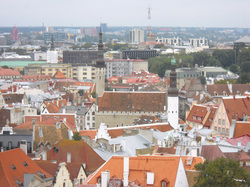| | Nazi occupation. That nation’s rise from this to one of the freest and most transparent nations on earth is a little-appreciated success story of the last 20 years. It is a story that holds some lessons for the United States, especially as we enter a month in which our nation will spend, collectively, billions of dollars in professional help just to file tax returns so complicated it is unlikely any one human being understands all the rules. If you were in Estonia you could go online with a secure account protected by both a card and code you keep in your head, and find your flat-rate tax information already filled out with your earnings on record. Check it over and approve it and your refund is on its way. The latest edition of The Ripon Forum, the magazine of the Republican think tank The Ripon Society, includes a detailed question-and-answer session with Tooma Hendrik Ilves, Estonia’s president and a product of the New Jersey public school system, Columbia and the University of Pennsylvania. His parents, like those Estonians I had met, escaped to Sweden and found their way to the United States. In the eighth grade in New Jersey, Ilves had a teacher who taught him computer programming. That is now a theme, of sorts, for Estonia where, beginning this year, all first graders will be taught to program. “…the idea is that you can, as a child, learn how to program just as you learn a new language,” he told the magazine. Over time, this is likely to solidify Estonia’s position in the ever-evolving world of computers and cyberspace, even as it leads to countless startups. Already, Estonia is the birthplace of Skype, a program that is disrupting traditional telecommunications companies as it allows people to connect through video technology for free. Read about Estonia’s transparent Internet-laden government and your first thought may be that it never could work here. You’re probably right. The first pre-requisite would be for the population to develop a healthy trust of government — the opposite of what exists here. Estonians carry what amounts to national ID cards, which Ilves prefers to call a “personal access key.” Try that here and you would instantly reduce the unemployment rate for conspiracy theorists. For his part, Ilves thinks it’s nuts that we trust our security to a three-digit CVC code on our credit cards. Estonia’s card allows access to 330 services. Go to the doctor and he can put your prescription on your card, which you take to the pharmacy for quick and easy service. If you need a refill, the doctor can remotely add it to your card. Estonians own their own medical data and can access it any time. And yes, people vote online. Transparency is Ilves’ hedge against corruption. The more information is available to everyone, the less that can go on in the dark. “You can’t bribe a computer,” he said. There are reasons to be skeptical about this system. Estonia’s government provides free wifi access to everyone, which probably isn’t the most efficient way to spread the Internet. Unemployment remains above 9 percent. And of course, anyone who hacked into the nation’s computers could cause serious problems. Also, It’s likely easier for a nation of 1.3 million people to trust a government-issued card that a diverse nation of 310 million. A general distrust of government can be a good thing. But it’s hard to ignore a nation that has risen from the chains of communism to the 13th freest economy in the world, as measured by the Heritage Foundation’s Index of Economic Freedom. The nation’s public debt is a scant 6 percent of gross domestic product. That index noted that Estonia suffered like everyone else during the recent economic downturn, but that its “determination to defend economic freedom has contributed to its swift, strong rebound over the past two years.” Would that our leaders had such a determination. |
|
0 Comments
Your comment will be posted after it is approved.
Leave a Reply. |
Search this siteLike what you read here? Please subscribe below, and we'll let you know when there is a new opinion.
The author
Jay Evensen is the Opinion Editor of the Deseret News. He has more than 40 years experience as a reporter, editor and editorial writer in Oklahoma, New York City, Las Vegas and Salt Lake City. He also has been an adjunct journalism professor at Brigham Young and Weber State universities. Archives
July 2024
Categories
All
Links
|


 RSS Feed
RSS Feed

